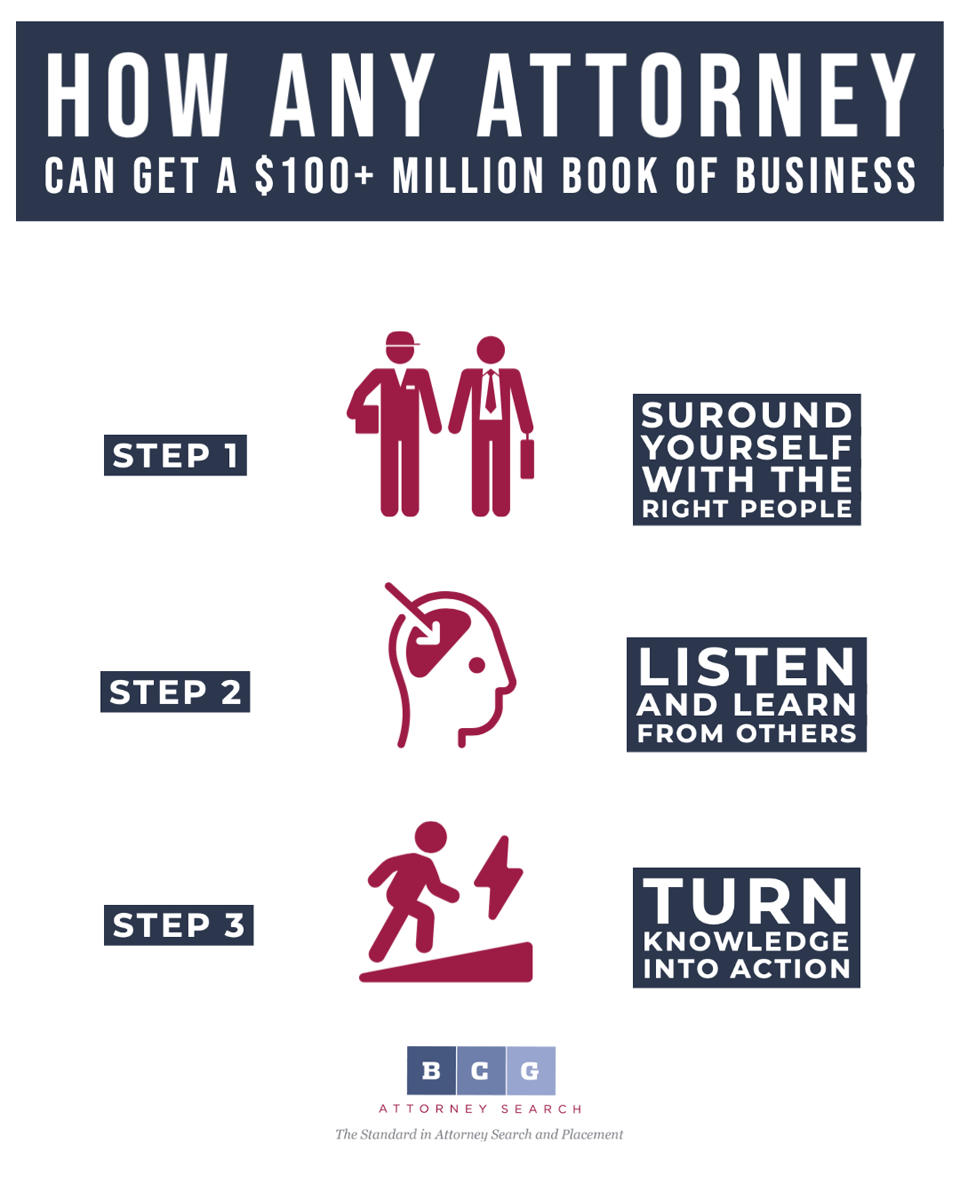Harrison Barnes' Legal Career Advice Podcast - Episode 12
Listen to How Any Attorney Can Get a $100+ Million Book of Business, Become a Partner in a Major Law Firm, or Start a Successful Business and Retire Whenever They Want Podcast
Most attorneys will never reach their goals.
There are two keys to succeeding at anything—although it is a bit more complicated than that, which I will explain shortly.

But regardless of your profession, one fact is always true. If you are going to succeed at anything, the most important thing is knowing what you need to do.
To succeed at a high level, you need to learn the habits and ways of thinking of others who have succeeded at a high level to be like them. The quality of your life will be in direct proportion to what you know and, for the most part, the people you surround yourself with. Your career and life can quite literally be anything you want them to be. The solution is relatively easy—you need to take the right actions and be around the right people.

|
| Harrison Barnes |
The most powerful men and women in business, politics, medicine, law, entertainment, and other pursuits generally do not spend their time hanging around people who are not like them. Instead, they seek out and are attracted to other winners. Do you think someone like Donald Trump, Bill Gates, or Jeff Bezos has time to spend with people who are not also trying to change the world and do great things? Their days are filled with meetings, discussions, and friendships with people just like them. They spend their time learning what is working and is not working.
The most successful people learn from others' mistakes, network into new opportunities, and learn how to be better. Did you know that Jeff Bezos muscled his way into an early investment in Google that was not entirely welcome, but that he learned about due to his connections? Now imagine him doing this sort of thing thousands of times with multiple opportunities he learned about through his network of people—is it no wonder he is the richest man in the world?

See Related Articles
- Why Networking Is Essential to Your Success as an Attorney
- If You Really Want Success, Go through Unpeopled Ground
How Being around the Right People Changed Me
Until I was about 14, I went to a public school in a relatively middle-class part of Detroit and lived with my mother. My father was a Harvard graduate with different values and because of these values, when I went to live with him at the age of 14, I was exposed to a different way of thinking about school and achievement. Coincidentally, I was also exposed to different types of kids who had different values.
Every day, my dad asked me how my classes went. I was praised when I did well in school and my father would tell me how disappointed he was when I did not do well. I was pushed to excel in competitive sports, run for student council positions, and do things that would distinguish me from other students. I was told that I should never be average, encouraged to spend time with other motivated kids, and constantly reminded of what I needed to do to get into Harvard or other top schools.
This was far different from what I was exposed to when living with my mother. In her home, there was no push to do anything in particular—other than be a rock star. Not a high achiever, but a literal rock star. My mom and her friends would sit around the house at night smoking pot and drinking. It was not an environment that stressed academics, athletics, or leadership. When I was ten, my mom bought me a guitar and started driving me to guitar lessons to learn electric guitar. I was encouraged to be wild, express myself, and told I had a great voice.
Within a short time of moving in with my dad, I went to an international school in Bangkok and I was exposed to kids from Thailand, Japan, China, and other countries who took their schoolwork extremely seriously. It was not a good environment for someone who wanted to be a rock star—that dream never would have flown there. I had never seen anything like it or been around kids who were so serious about school.
Because of my home environment and because I was competitive, I started trying to get the best grades and actually enjoyed studying six hours a night to try to beat these kids. Excelling was the dominant value system in that school, and I took to it. Sports were not important because there was no one to play games against because it was the only international school in Bangkok. Drugs were not important because the school did random drug tests all the time and if you were caught, you were expelled with no other international school to attend. Sex and dating were not important because most of the kids there—except the Swedish, Australians, and Americans—were from very conservative cultures.
Before going to the school, I was already running around in Detroit with kids whose dominant value system was drugs and dating. They did not talk about their futures or the grades they hoped to get—they talked about who they wanted to date, where to get drugs, the concerts they wanted to go to, and more. My other friends were athletes and I played competitive soccer and tennis, but these kids were boring to me. I was going down a bad path.
By the time I was sixteen and started seeing my friends from back then, their career aspirations were things like working in car factories and being postmen. The best of them were interested in going to college—but certainly not the top schools. The ones who wanted to go to college were interested in getting the sorts of degrees where they could immediately get jobs after graduating and did not aspire to anything higher.
Going to Thailand and that school changed me. When I returned to the United States, I went to an extremely competitive private school where most of the kids went to top colleges and then professional schools after that. I recently attended my high school reunion and most of the people I met were doctors, lawyers, investment bankers, and owners of good-sized professional businesses.
The point is that the people we are around and learning from shape who we become. The people we learn about and study shape who we become. Our values are shaped by the decisions we make about where we spend our time and who we spend time with. If we can gravitate towards and spend time with the most successful people, learn from them, and do what they do, we will become better.
Listen and Learn from Others
The reason why getting into the best colleges, law schools, and law firms is so important is because you are likely to be surrounded by other successful people, learn what they are doing, and pick up on their ways of thinking and habits. It is not about prestige or money. It is being around people you can learn from and who by association will push you to be the best you can be.
- Realistically, if you wanted to, you could become like Warren Buffet and be very, very wealthy if you learned how to invest successfully. He has a way of thinking about investing and business that others could learn—and he would certainly teach you—if you were able to spend years with him. Warren Buffet's investment strategy has been the subject of countless books. Each year, Buffet also publishes his thoughts about what he is doing before his investment conferences. He is literally an open book, and anyone can learn about his methods rather quickly. If you had enough time to study his ways of thinking and his actions, you too could be on your way to becoming the best investor in the world and one of the richest as well.
- You can be a partner in virtually any law firm you want to—if you get large enough clients and enough business. It does not matter where you went to law school, or how you did there, or even what firm you are currently with. With a few notable exceptions (Gibson Dunn, Wachtel Lipton, Cravath, Sullivan & Cromwell, Latham & Watkins, and a few other law firms I apologize for not mentioning), most law firms will welcome you if you do this. But first, you would need to learn how—there is a way of thinking and doing things that gets you significant clients.
Even if the largest law firms would not have you, you certainly could still be a wealthy practicing lawyer in the United States if you wanted to. You would need to learn a niche such as class action litigation or asbestos and could start filing significant lawsuits. You would need to learn about what is going on at conferences, start networking, and make friends with the most successful lawyers out there.
However, more than just learning how to do something, you need to do it. This is the second most important thing. It does not matter what you know—you need to do it.
See Also:
- Making Rain: Ingredients for Success
- The One Simple Rule You Must Understand for Succeeding in a Law Firm: Ignore this Rule at Your Own Peril
Turn Knowledge into Action
Just because I was surrounded by a bunch of kids who took school extremely seriously did not mean that I was automatically going to be like them. I had to start working hard and make studying and school my priorities and the most crucial things in the world to me. I had to meet with teachers after class and ask more questions. I had to make friends with other kids who also took school seriously and talk with them about what they were doing. Then, I had to commit to these ways of thinking and being for the next ten years of my life until I graduated from law school.
If you wanted to be like Warren Buffet, you would need to learn to invest according to his rules and never deviate from them. While Warren Buffet is more than happy to share his rules of investing, very few people ever follow them. Instead, they get distracted by other investments that look better or seem to promise faster results.
For example, instead of buying during depressed markets, they will purchase stocks when the market is appreciated, and everyone else is purchasing the same things. They will invest when Warren Buffet is not investing and lose money. They will also sell when Warren Buffet is not selling and lose money in the long run. They will micromanage businesses that do not need micromanaging when Warren Buffet is leaving them alone—and so forth.
In terms of becoming a partner in a major law firm by getting a lot of business, there are ways to do this even if you do not start in a large law firm. I know of one attorney who began on his own as a solo practitioner and now works in a major law firm and has a book of business of over $100 million (probably closer to $200 million). He started out doing small labor and employment matters, performed well at them, and worked hard. He was able to bring in these matters by checking court records every day to find out who was being sued and then cold calling each business. He promised to work hard, do a good job, and work for less money. He spent a couple of hours cold calling companies every morning. In addition to cold calling, he spent several nights a week going out to dinner and networking with these clients to learn about them and their families.
Over time, these companies had him do more significant work, and he hired other attorneys to help him. Then he started working on substantial matters. One day, a case he got as a fluke from one of the largest companies in the United States became a major national news story all over The Wall Street Journal, New York Times, national news networks, and business magazines. This attorney became a nationally known attorney, and significant amounts of business followed as larger companies saw what he and his small firm were capable of.
See Also:
- Showing Up: The Difference between Those Who Get Hired and Advance in Law Firms and Those Who Do Not
- Create Rules that Make You Feel Successful, Not Unsuccessful
Why can other attorneys not find the same success? Because they limit what they are willing to do.
- Most attorneys would not be willing to spend hours cold calling every morning and invest so much time prospecting for business.
- Most attorneys would not be willing to work harder and make every case they work on the most important thing in the world.
- Most attorneys would not be willing to ask for more significant cases when they come along.
- Most attorneys would not be willing to commit and curtail their ambition.
- Most attorneys might be happy staying where they are for the long term. The attorney described above could have kept doing basic labor and employment cases. Instead, he dreamed of something different and set himself up for reaching those goals.
Everyone knows that if you want to lose weight, you need to eat less. People who are trying to lose weight, however, rarely follow this simple advice. They will learn more ways to lose weight. They may buy weight loss pills, read all sorts of books about dieting, go to various classes, buy exercise equipment, and more. They do all of this stuff and keep studying every new fad about losing weight, but never actually lose weight. They know what to do to lose weight, but are unwilling to follow through and do it. While massive success is possible, consistent effort is the foundation—explore Top Strategies for Building a Book of Business and Staying Motivated to learn how attorneys sustain motivation during the long game.
If someone were going to lose weight, instead of just reading about it and dreaming about it, they would need to buckle down and take the action needed to lose the weight—not sporadic action. Not just talking about action, but real action. Action where they did the work, continued the work, and did not stop doing the work until they succeeded. Once they succeed, they would need to move forward and never look back. This is what succeeding looks like. You learn what you need to do, buckle down, and make permanent changes in the way you operate.
See Also:
- How Much Do You Want It? Pursuing Career Fulfillment and Success: How Hard Are You Willing to Work to Have a Positive Career Transition?
- A Success Turnaround Formula That Works
Surround Yourself with Greatness
Years ago, I met with a man who had made hundreds of millions of dollars running a real estate seminar company. He retired and then decided to spend the rest of his time trying to find out what was most important in making people happy and successful. He traveled around the world and met with all sorts of people. After more than five years of study, he concluded that the people we surround ourselves with, their values, and the things they believe in are the most important to making us both happy and successful. In short, you learn how to be happy and prosperous from the people you spend your time around. He believed that as long as you spent your time around people who were not happy or successful, you likely would not be as well.
During our conversation, we started discussing people who went to some of the top-ranked private schools in the country—schools where a lot of people come out and are very successful. He believed that a key to the success of many of these people was the fact that when they were younger, they were around people who had high standards for themselves, thought about the world in a certain way, and were committed to trying hard and following through—in academics, sports, leadership, and other disciplines. Surrounding yourself with people who are dedicated to performing as well as possible makes you likely to succeed as well.
I regularly read books about the most successful people out there. Reading these books and studying these people is something that has helped me do well in business. In almost all instances, when you study these people, what you find is that they have spent significant time around others who also had very high standards for themselves, and they operated in a committed environment. This, in turn, made them succeed in the future as well. Someone like Reid Hastings, the founder of LinkedIn, was a consummate networker and regularly met with and picked the mind of others. While there are images of the “Lone Entrepreneur,” the truth is that the most successful people in most disciplines owe their success to the people they spent their time around and these people raising the standards of what was acceptable for them.
See Related Articles:
- Why Your Success and Happiness as an Attorney is About Being Someone Who Builds the Firm and People there Up and is Not a Source of Negativity and Problems
- Plan for Success-Not Failure
- How to Succeed in the Practice of Law
How Does This Work?
If you spend your time around people who have certain habits, think about the world a certain way, and have certain beliefs, the odds are excellent, you will adapt and become like them. You will know what it takes to do well and be successful. You will understand their values and be more likely to work hard, commit, and put your head down as well. You will look back and not even realize how you became so successful.
In terms of weight loss, the biggest issue that most people face when trying to lose weight is that they spend their time around the wrong people. If someone wants to succeed at losing weight, they are far more likely to succeed if they surround themselves with others who are doing the right things to lose weight.
I have many relatives all over the Midwest. While there are lots of exceptions, in many small towns in Ohio and other areas, the norm is overeating and not being fit. In fact, in one town I am thinking of, the entire city seems to be overweight. There is nothing wrong with this—it is the norm in this town, and the town is isolated enough that everyone reinforces these values among each other.
There is a startling difference to what I see when I walk around Los Angeles and where I live in Malibu, California.
I spend most of my spare time with my girlfriend. She makes me a protein shake for breakfast. We get up at 5:30 AM, and I am in the office by 6:00 AM. At 12:30, I come home for lunch and exercise with her for two hours. We do not actually eat lunch. After work, we go to a yoga class at 6:30 PM on most nights.
We then typically come home and have a small dinner because we are exhausted from all of the exercising and early rising. We do this Monday through Thursday. On the weekends, the situation is similar—however, I have my kids on the weekends, so we do all sorts of physical activities with them. My girlfriend was raised in Malibu and her values reflect her surroundings. Her father was a famous male model from Paris and her mother was highly educated. She is a former competitive athlete and model with the goals of the people she was raised around. Her values are fitness, looking good and education. She is probably one of the only women who graduated from Harvard College who became a model. Had she been from Washington, DC, she might have prioritized being a lawyer or working in politics—but incredibly, her values are things like modeling and surfing.
We become like the people we spend time around and what our environments imprint on us. If my girlfriend were from a working-class town in Ohio, or a town like I grew up in until I was thirteen, her values would be far different.
Because I spend so much time with her, it would be difficult for me not to be fit. Aside from work, fitness is the focus of what I spend my time doing. It would also be difficult for me not to prioritize work because I spend at least nine hours there a day, every day.
Each weekend, I read various business books and study people who are trying to make a difference in the world. I surround myself with these ideas as well and make them part of who I am. I hire coaches and other people to keep me on track and share their ideas with me. I have mission statements that I read about my goals each morning. I have life goals, annual goals, quarterly goals, weekly goals, and daily goals. I do everything I can to keep myself on track. My goals are important to me, and planning is important. You can adopt these practices whatever your goals may be. Each of the people that work in our company has quarterly goals, and I review them with my managers each quarter.
I also spend time going to conferences to get new ideas and have meetings for at least an hour each day with the leadership team in our companies. I would not make so many attorney placements if I did not prioritize work in my life and spend my days doing more, learning more and taking action. I would also not be fit if I did not spend my days with someone who prioritizes this in her life and takes action. In my view, I would not have the energy to commit to the legal placement business if I was not continually at my best physically as well.
The people you spend your time with will rub off on you and contribute to your success. You also need to study what is going to make you successful. The action you take in response to this will make a major difference. If you do not take action, then nothing will happen.
If you want to make things happen in your life and career, you need to know what to do and then take the right actions consistently. It is as easy as that.
The next move is yours.
See Related Articles:
- How You Handle Chaos Will Determine Your Success or Failure
- Seven Reasons People Never Have the Successful Careers They Are Capable of
- Do Not Allow Others to Hold You Back from Success
About Harrison Barnes
No legal recruiter in the United States has placed more attorneys at top law firms across every practice area than Harrison Barnes. His unmatched expertise, industry connections, and proven placement strategies have made him the most influential legal career advisor for attorneys seeking success in Big Law, elite boutiques, mid-sized firms, small firms, firms in the largest and smallest markets, and in over 350 separate practice areas.
A Reach Unlike Any Other Legal Recruiter
Most legal recruiters focus only on placing attorneys in large markets or specific practice areas, but Harrison places attorneys at all levels, in all practice areas, and in all locations-from the most prestigious firms in New York, Los Angeles, and Washington, D.C., to small and mid-sized firms in rural markets. Every week, he successfully places attorneys not only in high-demand practice areas like corporate and litigation but also in niche and less commonly recruited areas such as:
- Immigration Law
- Workers Compensation
- Insurance
- Family Law
- Trust and Estate
- Municipal law
- And many more...
This breadth of placements is unheard of in the legal recruiting industry and is a testament to his extraordinary ability to connect attorneys with the right firms, regardless of market size or practice area.
Proven Success at All Levels
With over 25 years of experience, Harrison has successfully placed attorneys at over 1,000 law firms, including:
- Top Am Law 100 firms such including Sullivan and Cromwell, and almost every AmLaw 100 and AmLaw 200 law firm.
- Elite boutique firms with specialized practices
- Mid-sized firms looking to expand their practice areas
- Growing firms in small and rural markets
He has also placed hundreds of law firm partners and has worked on firm and practice area mergers, helping law firms strategically grow their teams.
Unmatched Commitment to Attorney Success - The Story of BCG Attorney Search
Harrison Barnes is not just the most effective legal recruiter in the country, he is also the founder of BCG Attorney Search, a recruiting powerhouse that has helped thousands of attorneys transform their careers. His vision for BCG goes beyond just job placement; it is built on a mission to provide attorneys with opportunities they would never have access to otherwise. Unlike traditional recruiting firms, BCG Attorney Search operates as a career partner, not just a placement service. The firm's unparalleled resources, including a team of over 150 employees, enable it to offer customized job searches, direct outreach to firms, and market intelligence that no other legal recruiting service provides. Attorneys working with Harrison and BCG gain access to hidden opportunities, real-time insights on firm hiring trends, and guidance from a team that truly understands the legal market. You can read more about how BCG Attorney Search revolutionizes legal recruiting here: The Story of BCG Attorney Search and What We Do for You.
The Most Trusted Career Advisor for Attorneys
Harrison's legal career insights are the most widely followed in the profession.
- His articles on BCG Search alone are read by over 150,000 attorneys per month, making his guidance the most sought-after in the legal field. Read his latest insights here.
- He has conducted hundreds of hours of career development webinars, available here: Harrison Barnes Webinar Replays.
- His placement success is unmatched-see examples here: Harrison Barnes' Attorney Placements.
- He has created numerous comprehensive career development courses, including BigLaw Breakthrough, designed to help attorneys land positions at elite law firms.
Submit Your Resume to Work with Harrison Barnes
If you are serious about advancing your legal career and want access to the most sought-after law firm opportunities, Harrison Barnes is the most powerful recruiter to have on your side.
Submit your resume today to start working with him: Submit Resume Here
With an unmatched track record of success, a vast team of over 150 dedicated employees, and a reach into every market and practice area, Harrison Barnes is the recruiter who makes career transformations happen and has the talent and resources behind him to make this happen.
A Relentless Commitment to Attorney Success
Unlike most recruiters who work with only a narrow subset of attorneys, Harrison Barnes works with lawyers at all stages of their careers, from junior associates to senior partners, in every practice area imaginable. His placements are not limited to only those with "elite" credentials-he has helped thousands of attorneys, including those who thought it was impossible to move firms, find their next great opportunity.
Harrison's work is backed by a team of over 150 professionals who work around the clock to uncover hidden job opportunities at law firms across the country. His team:
- Finds and creates job openings that aren't publicly listed, giving attorneys access to exclusive opportunities.
- Works closely with candidates to ensure their resumes and applications stand out.
- Provides ongoing guidance and career coaching to help attorneys navigate interviews, negotiations, and transitions successfully.
This level of dedicated support is unmatched in the legal recruiting industry.
A Legal Recruiter Who Changes Lives
Harrison believes that every attorney-no matter their background, law school, or previous experience-has the potential to find success in the right law firm environment. Many attorneys come to him feeling stuck in their careers, underpaid, or unsure of their next steps. Through his unique ability to identify the right opportunities, he helps attorneys transform their careers in ways they never thought possible.
He has worked with:
- Attorneys making below-market salaries who went on to double or triple their earnings at new firms.
- Senior attorneys who believed they were "too experienced" to make a move and found better roles with firms eager for their expertise.
- Attorneys in small or remote markets who assumed they had no options-only to be placed at strong firms they never knew existed.
- Partners looking for a better platform or more autonomy who successfully transitioned to firms where they could grow their practice.
For attorneys who think their options are limited, Harrison Barnes has proven time and time again that opportunities exist-often in places they never expected.
Submit Your Resume Today - Start Your Career Transformation
If you want to explore new career opportunities, Harrison Barnes and BCG Attorney Search are your best resources. Whether you are looking for a BigLaw position, a boutique firm, or a move to a better work environment, Harrison's expertise will help you take control of your future.
Submit Your Resume Here to get started with Harrison Barnes today.
Harrison's reach, experience, and proven results make him the best legal recruiter in the industry. Don't settle for an average recruiter-work with the one who has changed the careers of thousands of attorneys and can do the same for you.
About BCG Attorney Search
BCG Attorney Search matches attorneys and law firms with unparalleled expertise and drive, while achieving results. Known globally for its success in locating and placing attorneys in law firms of all sizes, BCG Attorney Search has placed thousands of attorneys in law firms in thousands of different law firms around the country. Unlike other legal placement firms, BCG Attorney Search brings massive resources of over 150 employees to its placement efforts locating positions and opportunities its competitors simply cannot. Every legal recruiter at BCG Attorney Search is a former successful attorney who attended a top law school, worked in top law firms and brought massive drive and commitment to their work. BCG Attorney Search legal recruiters take your legal career seriously and understand attorneys. For more information, please visit www.BCGSearch.com.
Harrison Barnes does a weekly free webinar with live Q&A for attorneys and law students each Wednesday at 10:00 am PST. You can attend anonymously and ask questions about your career, this article, or any other legal career-related topics. You can sign up for the weekly webinar here: Register on Zoom
Harrison also does a weekly free webinar with live Q&A for law firms, companies, and others who hire attorneys each Wednesday at 10:00 am PST. You can sign up for the weekly webinar here: Register on Zoom
You can browse a list of past webinars here: Webinar Replays
You can also listen to Harrison Barnes Podcasts here: Attorney Career Advice Podcasts
You can also read Harrison Barnes' articles and books here: Harrison's Perspectives
Harrison Barnes is the legal profession's mentor and may be the only person in your legal career who will tell you why you are not reaching your full potential and what you really need to do to grow as an attorney--regardless of how much it hurts. If you prefer truth to stagnation, growth to comfort, and actionable ideas instead of fluffy concepts, you and Harrison will get along just fine. If, however, you want to stay where you are, talk about your past successes, and feel comfortable, Harrison is not for you.
Truly great mentors are like parents, doctors, therapists, spiritual figures, and others because in order to help you they need to expose you to pain and expose your weaknesses. But suppose you act on the advice and pain created by a mentor. In that case, you will become better: a better attorney, better employees, a better boss, know where you are going, and appreciate where you have been--you will hopefully also become a happier and better person. As you learn from Harrison, he hopes he will become your mentor.
To read more career and life advice articles visit Harrison's personal blog.













